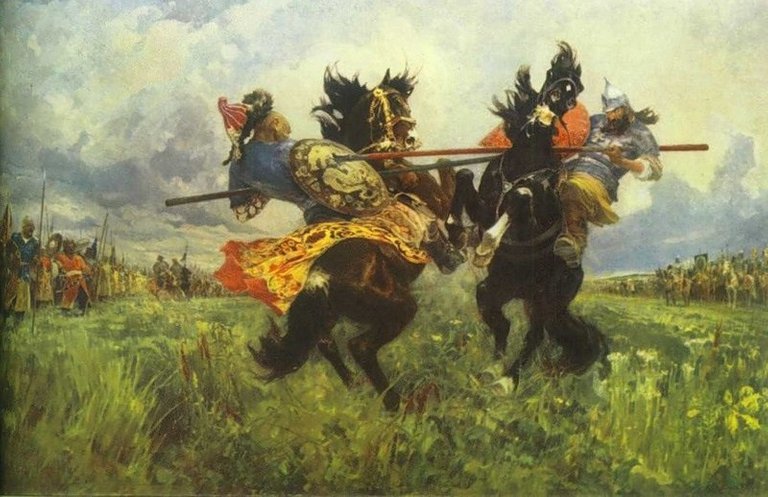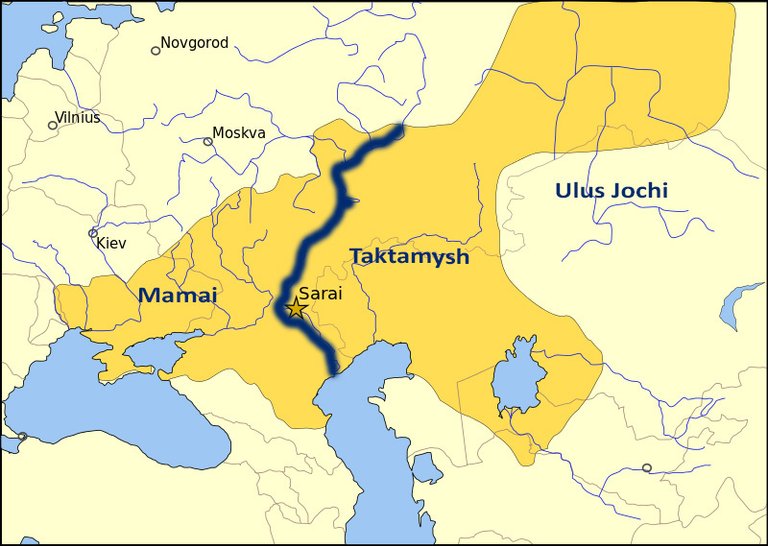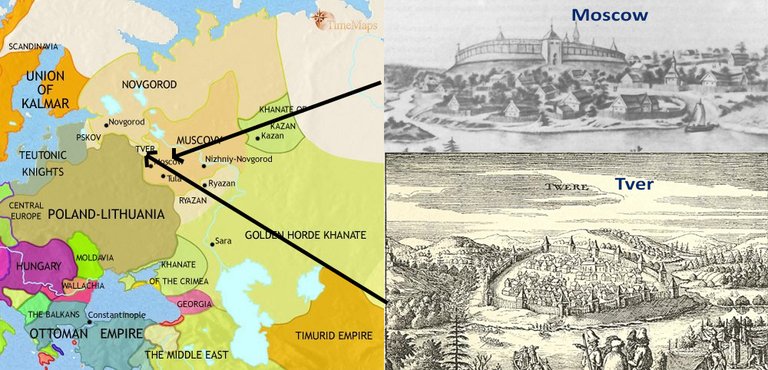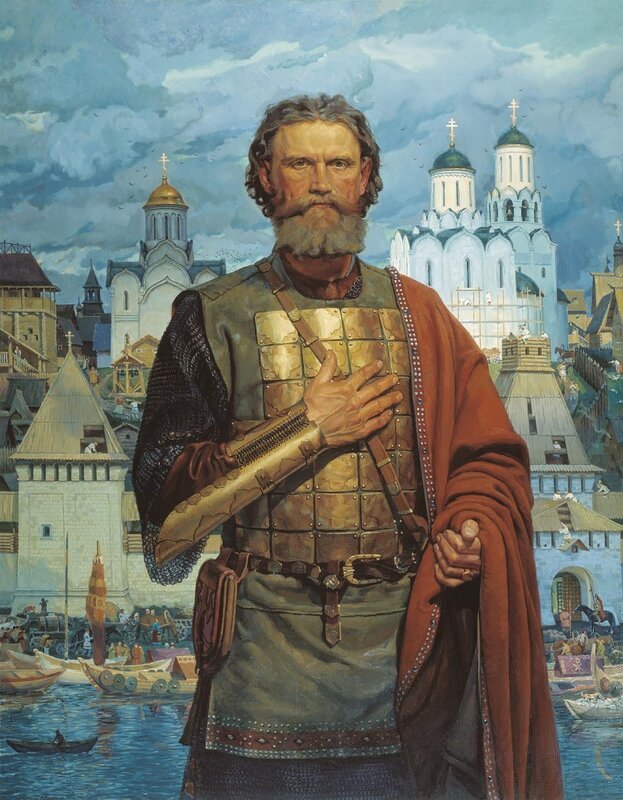Hi Friends,
For me, this is a somewhat unusual story, as it compelled me to go in some depth into medieval history.
I explain how and why the story was written in Part 1. In Part 2 I started to discuss the situation of 14th century Russia. If you read this far that you might find the evens written in this part of the story equally interesting.
The nomad
Part 3

In those days Russia was by no means monolithic. Moscow had to compete for the title of the Grand Duke with Suzdal and Nizhny Novgorod. And then, when these competitors were eliminated from this side, Tver came to the stage, which actively tried to intercept Moscow in its quest for a paisa on the Grand duchy of Vladimir.
Surely Tatars and, specifically, Mamai used this internal struggle for his benefits. During “The Great Mix up” the Golden Horde ceased to be the monolithic force that everyone feared to a tremble in their knees from Ryazan to Poland's western borders and beyond. The Horde began to fall apart and ulus of Jochi split across the Volga River.


|
The Golden Horde or Ulug Ulus - lit. “Great State” in Turkic was originally a Mongol and later Turkicized khaganate established in the 13th century and originating as the northwestern sector of the Mongol Empire. With the fragmentation of the Mongol Empire after 1259 it became a functionally separate khanate. |
A real genghizid (a descendant of Genghis khan)- Khan Taktamysh claimed the eastern part with its capital in Sarai. However, the Western Tatars and Mamai in particular were not quite in agreement with it and there was a long and bloody civil war between them. One can say that the Western part was owned by Mamai. Although this ownership hasn’t been unconditional, because the region of Volga Bulgaria, that is, the northern part of the ulus of Jochi began to gradually leave the power of Mamai. Since there was no real genghizid on the throne, each mirza wanted a little power to himself.
For Russia, this was good, because the mighty force, with which before no one even thought of the possibility to compete, ceased to be this colossal behemoth. That is, it became possible, if not to fight with it on equal terms than to pursue political dialogue on equal terms.
On the other hand, now every mirza that had enough audacity could now gather himself a gang of thousand swards, and collect no longer an ordered tax, but a casual tribute. “I'll want it and I'll take it! And try to stop me!”

|
Mirza (/ˈmɜːrzə/ or /mɪərˈzɑː/; Persian: میرزا) is a name of Persian origin. It is used as a surname or prefix to identify patriarchal lineage. It is derived from a historical title of Persian origin (Mīrzā), denoting the rank of a royal prince, high nobleman, distinguished military commander, or a scholar. |
As a result, the Russian dukes were forced to resist. And not just the Russians. In 1362, near the place by the name “Blue Waters”, Lithuanian duke Algirdas fought back the private raid of three Tatars mirzas and defeated them.
Twice Russian dukes have beaten Tatars as well. The battles were in 1363 years on River Pian, and at Prishlev Forest. Details are unknown, except that the first time the attacker was Mirza Tagai, who owned the territory of Mordva, while another time the attacker was the ruler of Volga Bulgaria. But these were private raids. These were not the raids of colossal 13-century tumens.

|
Tumen, or tümen, was a part of the decimal system used by the Turkic peoples and Mongol peoples to organize their tribal life and armies. Tumen is a social and military unit of 10,000 households and soldiers. |
Everyone understood - it is possible to fend against Tatars. At least, try to fend against them. Or to negotiate. Which is what everyone did anyway.
At this time, Mamai perfectly understood that his situation is precarious and that he has only one source of constant income - Russia. Therefore on the account of Russia, he had to do according to the old Roman tradition “to divide and rule.” Thus, Mamai deprived Moscow duke Dmitry of the paisa for the grand duchy and gave it to the main opponent of Moscow - Mikhail of Tver.



|
Dmitry Ivanovich Donskoy, or Dmitry of the Don, sometimes referred to simply as Dmitry, son of Ivan II the Fair of Moscow, reigned as the Prince of Moscow from 1359 and Grand Prince of Vladimir from 1363 to his death. He was the first prince of Moscow to openly challenge Mongol authority in Russia. |
Transcripts of this congress of dukes didn’t preserve. Yet, already in the year 1375, there was a grandiose campaign where all Moscow regional dukes and all regional dukes of Vladimir, including the duke of Vladimir city itself assembled against Tver. Even the duke of Kashino, which is a principality subordinate to Tver, joined the coalition forces. Yaroslavl and Rostov the Great joined the coalition. Even Novgorod, who was an ally of Tver, having suddenly realized that the force is not on the side of Tver, immediately broke all allied relations with Tver, and provided the military contingent on the side of Dmitry. Thus, in 1375 Tver was completely brought to obedience. No longer had it claimed the status of the center of Russia.
After the partition of the ulus of Jochi, Mamai had the control over regions of Crimea, the steppes between the Black and Caspian seas, up to the Mordov limits. Because after the Russian dukes defeated mirza of Tagai, Mamai subordinated his horde.
Despite the fact that these territories were only a chunk of the once invincible Golden Horde, Mamai demanded from Russia the taxes of Jani Beg’s time - that is, the time of the maximum rise of power of the Golden Horde. At that time, Russia was paying the maximum tax to the Golden Horde. Dmitry could not accept that.
He was willing to pay. Moreover, he did pay regularly, collecting taxes from his subjects. The regular payment was a condition of his Grand Duchy. Still, everything had its limits. Beyond those limits, the taxes ceased to be reasonable. Dmitry understood that fighting the Horde would still be more expensive than paying. Still when a certain threshold was exceeded, it became clear that if Russia were to feed Mamai, it would have to feed him for life. Big taxes would have given Mamai the opportunity to recruit an even larger army, defeat all his competitors in the East, unite Jochi's ulus and after that, there would be no way to fight him. Russia would not be able to overcome this behemoth, as it could not defeat united Horde before.
Therefore, a very representative coalition of dukes gathered in Pereyaslavl Zalessky. Its content wasn't constant. For example, Dmitry's loyal ally, Nizhny Novgorod, was forced to withdraw from the coalition after some time. Novgorod the Great, like a medieval republic of traders, was where at the moment it was profitable. On the Kulikov field, Novgorod already didn’t help Moscow. The Ryazan principality, which was also in the first part of the conglomerate, was forced to withdraw. The Western dukes, those who bordered with the Grand Principality of Lithuania, wobbled from one direction to the other. Russia was in a state of feudal fragmentation at this time. Alliances were made and torn with incredible ease. Even within Moscow itself, there was no single monolithic policy.